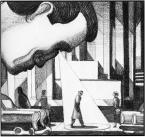The Angel Makers: Arsenic, a Midwife, and Modern History’s Most Astonishing Murder Ring by Patti McCracken, William Morrow, 337 pages, $32.99.
Clearly, this isn’t a book to curl up with at bedtime or for beach reading. For more than 15 years after World War I, there were more than 160 mysterious murders in Nagyrev, a quiet Hungarian farming village near the Austrian border.
Patti McCracken, now a Chilmark winter resident but for 17 years an award-winning journalist in Eastern and Central Europe, had heard rumors about these curious Hungarian deaths. Her curiosity piqued by what she had heard, she began making visits to the village. Gradually, she learned more and more about the women in this macabre, fascinating book.
Ms. McCracken has had a long career as a journalist for the Wall Street Journal, the Smithsonian magazine and the Chicago Tribune. Researching and writing The Angel Makers took over a decade.
For the most part, the killers weren’t bloodthirsty murderers. The leader of them was Auntie Suzy, the official village midwife. To help those for whom death seemed the only answer to a dire family or physical problem, Auntie Suzie had a fine remedy. She slowly stewed sheets of arsenic-laden fly paper in vinegar in her pretty village house whose yard abounded in flowers.
She stewed the vinegar-fly paper mix until she had a deadly untraceable elixir. She would always make sure she had some of this colorless, odorless white arsenic-laden potion in a stoppered vial in her apron pocket when she went on “medical” calls. In her other pocket, she kept her corncob pipe.
Auntie Suzy was not only the official village midwife, but the village physician, too. The nearest doctor lived five miles away. He was often unable to get to Auntie Suzy’s village of Nagyrev by inclement weather.
Auntie Suzy’s elixir had many uses. It might be given to a newborn when the mother had no milk for the baby. At other times, if a husband was unkind to his wife and happened to fall ill and need treatment, or if his wife was simply tired of him or thought him unfaithful, Auntie Suzy might be called on to “help out.” A little elixir could be put in his brandy or his goulash for a price.
On visits to neighbors’ homes, Auntie Suzy would look around to see what she might like in “payment” for her untraceable elixir — when a “doctored” sick husband died, Auntie Suzy might suggest that his widow would be the right wife for her son, or her price might be a house that she coveted.
For years, pipe-smoking, brandy-drinking Auntie Suzy’s ministrations went unnoticed, but when the son of the physician from the neighboring village took over his father’s practice, things changed. He made sure that Nagyrev was on his rounds and began to examine town records. It seemed to him there were too many newborns who had died in the village. Auntie Suzy was questioned about her activities as a midwife. She admitted to some irregularities and was put on trial for wrongdoing. She served a brief prison sentence, but before long she was back to her machinations.
There were others, both women and a few men, who were arrested and tried when investigators insisted on having the remains of those relatives disinterred in the graveyard. There were often traces of arsenic in the bones. Some people received long prison terms. One woman, convicted of murdering her husband, was the first woman hanged in Hungary in 80 years. Eventually, as her friends and fellow villagers were found guilty of unexplained deaths, Auntie Suzy committed suicide.
The Angel Makers is a macabre tale told well, in riveting true crime fashion.







Comments
Comment policy »